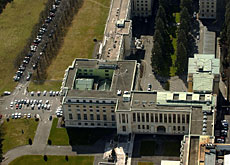Geneva and UN need to get closer

Jean Freymond of the Centre for Applied Studies in Negotiations (CASIN) tells swissinfo the authorities should do more to support international Geneva.
Since the creation of the United Nations 60 years ago, Switzerland has benefited from the presence of the organisation’s European headquarters in the city.
The UN’s 60th General Assembly is currently underway at its headquarters in downtown New York.
In Geneva, which hosts the UN’s specialist and operational agencies, celebrations are seeking to bring the local population closer to the city’s international activities – a priority according to Freymond, CASIN’s director.
swissinfo: When did the UN open for business in Geneva?
Jean Freymond: Towards the end of the 1940s. Between the end of the Second World War and the arrival of the UN, Geneva had some very difficult years. Many people who lived through that time have told me that the city was a desert without the UN, its agencies and the other international organisations.
Having said that, the founding states of the United Nations chose New York as its main headquarters. And that was to avoid repeating the failure of the League of Nations, which was also located in Geneva. Even though it was one of the founding states, the US did not ratify the League’s founding accord.
With the seat of the UN in New York, there was greater assurance that the US would play a more active role at the heart of the organisation.
swissinfo: How have relations between international Geneva and Switzerland evolved over the course of those 60 years?
J.F.: Switzerland has always made a great effort to fulfil its role as host country to international organisations. In the early days, it was evident that these organisations could not locate anywhere but Geneva and the region surrounding the city.
Then competition from other cities such as Vienna emerged, when Austria’s Kurt Waldheim became secretary-general of the United Nations in 1972. Since then, a kind of agreement exists between Vienna and Geneva that each keeps the organisations that it hosts. But competition remains open for new organisations.
swissinfo: There is a divide between the people of Geneva and the international community. Has that always been the case?
J.F.: The international community in Geneva has grown considerably over the past 60 years. Apart from diplomats and international functionaries, it also includes an important immigrant population, not to mention the expatriates who work for multinational companies located in and around the city.
As a result, the proportion of local people working for the UN has dropped. Today, locals and other Swiss who live in Geneva are largely unaware of what happens on the international scene.
So it is essential to make the local population aware of the international activities going on in its midst.
International organisations are the cornerstone of Geneva and help fuel the economy. The attractiveness of the region in terms of its economy and tourism is also strongly linked to the presence of the UN and international agencies.
swissinfo: Are the Swiss and Geneva authorities doing enough to develop Geneva’s international appeal?
J.F.: We have the impression that the city, cantonal and federal authorities are all working separately. There isn’t really a coordinated approach, especially between the city and the canton of Geneva.
The canton’s representatives should also be much more present in the capital Bern and sell itself better. Regular support from the federal authorities is needed to boost the development of international Geneva.
swissinfo: How should international Geneva be developed?
J.F.: The UN is going through reforms at the moment. In New York changes from above are being negotiated. In Geneva, promising reforms from below are taking place.
The city has become an international focal point for health issues thanks to the World Health Organization and a series of other agencies. We are witnessing in Geneva the emergence of a new system of international governance, which unites the private sector, NGOs and governmental organisations.
This process is also at work in the humanitarian sector, and the fields of information society, business and development.
To encourage this trend, the Swiss should seek to improve their welcome, from transport and accommodation to educational and cultural offerings.
We must not forget that about thirty states do not yet have a diplomatic mission in Geneva. Switzerland should create the conditions for these nations to be represented in the city.
swissinfo-interview: Frédéric Burnand in Geneva
To celebrate the 60th anniversary of the United Nations in Geneva, the UN, the Swiss diplomatic mission, the city and canton of Geneva, the Foundation for Geneva, and the Red Cross Museum have joined forces for a special day on September 25.
The goal of the day is to strengthen ties between the people of Geneva and the 40,000 people working in international organisations.
To mark the occasion, many exhibitions, talks and concerts will take place between now and the end of the year.

In compliance with the JTI standards
More: SWI swissinfo.ch certified by the Journalism Trust Initiative

You can find an overview of ongoing debates with our journalists here. Please join us!
If you want to start a conversation about a topic raised in this article or want to report factual errors, email us at english@swissinfo.ch.